What is gene editing and what does the process actually entail?
According to [a UK Department of Food, Environment and Rural Affairs (DERFA)] consultation document, gene edited organisms do not contain DNA from different species, and instead only produce changes that could be made slowly using traditional breeding methods. Contrast this scenario with genetic modification, which would allow DNA from one species to be introduced into a different one.
The Agri-Food and Biosciences Institute (AFBI) believes that gene editing could make a real and positive difference when it comes to developing bespoke animal and plant breeding solutions and offers opportunities for the future of farming.
…
The public consultation posed the fundamental question: “Should gene editing continue to be regulated as a GMO?”
Professor Angela Karp, Director of Rothamsted Research said:“For plant breeding, there is no scientific justification for considering the introduction of targeted mutations in a crop by gene editing to be more risky than either mutations that occur naturally or random mutations induced using chemical or radiation mutagenesis.
“Moreover, the potential to improve to the safety and nutritional value of food crops through miniscule genomic changes introduced by gene editing, greatly outweighs any hypothetical risk of using the technology.”































